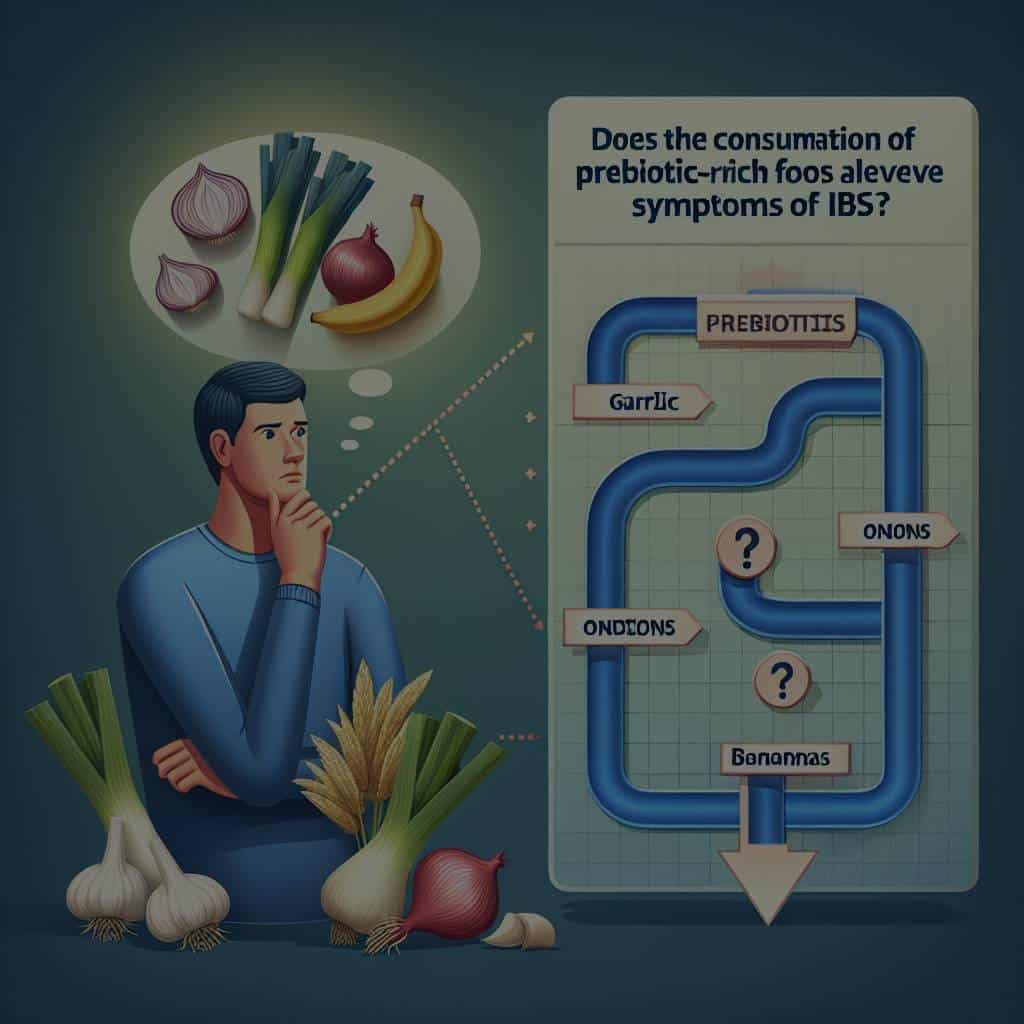Does the Consumption of Prebiotic-rich Foods Alleviate Symptoms of IBS?

When it comes to maintaining optimal health, the importance of a well-balanced gut microbiota cannot be overstated. Microbiota are communities of trillions of bacteria that inhabit our digestive tracts. These beneficial microorganisms assist in a number of bodily functions such as digestion, immune response, and even mental health. However, when these microbiota are out of balance, we can experience a range of health problems, including irritable bowel syndrome (IBS). IBS is a common condition that affects the digestive system, causing symptoms like stomach cramps, bloating, diarrhea, and constipation. One possible approach to managing these disruptive symptoms is through dietary changes, particularly the consumption of prebiotic-rich foods.
Understanding the Role of Prebiotics in Gut Health
Before delving into the potential benefits of prebiotics for IBS sufferers, it’s crucial to first understand what prebiotics are and how they function. Prebiotics are types of dietary fiber that feed the friendly bacteria in your gut. They are found in a variety of foods, including whole grains, bananas, onions, garlic, honey, and many others. These prebiotics help to promote a balanced and diverse gut microbiota, which is key to overall health.
Also read : What Are the Health Benefits of Switching to a Standing Desk at Work?
Several scholarly articles on Google Scholar and PubMed have highlighted the significance of prebiotics in maintaining gut health. According to a study published by Crossref in 2019, prebiotics can stimulate the growth and activity of beneficial bacteria in the gut, thereby improving digestion and strengthening the immune system.
Prebiotics and IBS: What Does the Research Say?
The question now is, how may prebiotics aid those struggling with IBS? There is a growing body of evidence suggesting that regular consumption of prebiotic-rich foods could potentially alleviate the symptoms of IBS.
Have you seen this : What Are the Long-Term Health Benefits of Living in Car-Free Urban Quarters?
A 2022 study published on PubMed examined the effects of a prebiotic-rich diet on patients with IBS. Participants who received a daily dose of prebiotics saw a reduction in symptoms such as bloating and stomach pain compared to those who did not. Although the study was limited by a small sample size, the results suggested that prebiotics may play a role in managing IBS symptoms.
Further research from Google Scholar supports this finding, indicating that prebiotics may enhance the gut’s barrier function, reducing the permeability that often leads to IBS symptoms.
Implementing a Prebiotic-Rich Diet for IBS Management
For those of you dealing with IBS, the idea of implementing a prebiotic-rich diet might seem daunting. However, it’s not as complicated as it might sound. There is a variety of delicious and nutritious foods rich in prebiotics that can easily be incorporated into your daily diet.
Fruits such as apples, bananas, and berries are great sources of prebiotics. Whole grains like oats and barley also contain these important fibers. Vegetables, particularly artichokes, garlic, onions, and leeks, also offer high amounts of prebiotics. And let’s not forget about fermented foods like yogurt, kimchi, and kefir, which are beneficial for gut health.
Remember, it’s advisable to consult with a healthcare professional or nutritionist before making significant changes to your diet, especially if you have a health condition like IBS.
Considerations for Prebiotics and FODMAPs for IBS Patients
As promising as the research on prebiotics and IBS may be, it’s essential to note that not all prebiotic-rich foods are suitable for everyone with this condition. Some of you may be following a low FODMAP diet, a common strategy for managing IBS symptoms. FODMAP refers to Fermentable Oligosaccharides, Disaccharides, Monosaccharides, and Polyols – types of carbohydrates that can cause digestive issues in some people.
Some prebiotic-rich foods are high in FODMAPs and may trigger symptoms in individuals with IBS. Foods such as onions, garlic, and wheat can potentially exacerbate symptoms in some people. Therefore, it’s crucial to approach a prebiotic-rich diet with caution and personalized guidance from a healthcare professional experienced in dietary management of IBS.
In conclusion, while the research into prebiotics and IBS is still ongoing, preliminary findings are encouraging. Incorporating prebiotic-rich foods into your diet could potentially alleviate symptoms of IBS, but it’s important to individualize this approach based on your personal tolerance and reaction to these foods. As always, with any change to your dietary regimen, especially involving a health condition like IBS, it’s crucial to consult with a healthcare professional.
The Interplay between Prebiotics and FODMAPs in IBS Treatment
With the substantial data linking prebiotics to improved gut health and alleviation of IBS symptoms, it is imperative to comprehend the complex relationship between prebiotics and FODMAPs. As mentioned earlier, some prebiotic-rich foods are high in FODMAPs, known to trigger IBS symptoms in some individuals.
FODMAPs are a group of short-chain carbohydrates that are poorly absorbed in the small intestine. These include foods such as onions, garlic, wheat, and certain fruits. For some individuals, consumption of high FODMAP foods can result in abdominal pain, bloating, and other IBS symptoms. This has led to the development of the low FODMAP diet, which restricts these potentially aggravating foods, allowing the gut time to heal.
However, the catch-22 is that many high FODMAP foods are also rich in prebiotics. This dilemma underscores the importance of personalized nutrition guidelines. While a low FODMAP diet may alleviate symptoms in the short term, the long-term implications for gut health must be considered. Restricting prebiotic intake may decrease gut microbial diversity, which is pivotal for maintaining optimal gut health.
A balance must be struck between managing immediate IBS symptoms and fostering a healthy gut microbiome. A tailored dietary plan can accommodate both a low FODMAP diet and the inclusion of prebiotic-rich foods that do not trigger IBS symptoms, ensuring the nourishment of gut bacteria without causing discomfort.
Future Directions and Conclusion
Looking ahead, more research is required to fully understand the role of prebiotics in managing IBS and how they interact with FODMAPs. Large-scale, randomized controlled trials using diverse populations can provide more robust data, contributing to more personalized dietary recommendations.
Additionally, exploring the potential of prebiotic supplements could be valuable. These could allow IBS sufferers to reap the benefits of prebiotics without the worry of high FODMAP intake. However, such supplements should be thoroughly researched and approved by healthcare professionals before use.
In conclusion, the consumption of prebiotic-rich foods shows promise in alleviating symptoms of IBS. However, the interplay between prebiotics and FODMAPs must be taken into account. This emphasizes the importance of personalized dietary plans, guided by healthcare professionals, for individuals with IBS. While the research is ongoing, the potential of prebiotics to enhance gut health remains promising. As we advance our understanding of the complex world of gut microbiota and its impact on conditions like IBS, we continue to uncover new possibilities for treatment and management strategies. Remember, each step taken towards better gut health contributes positively to overall well-being.
